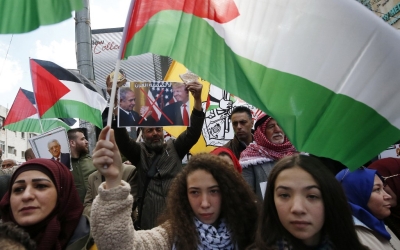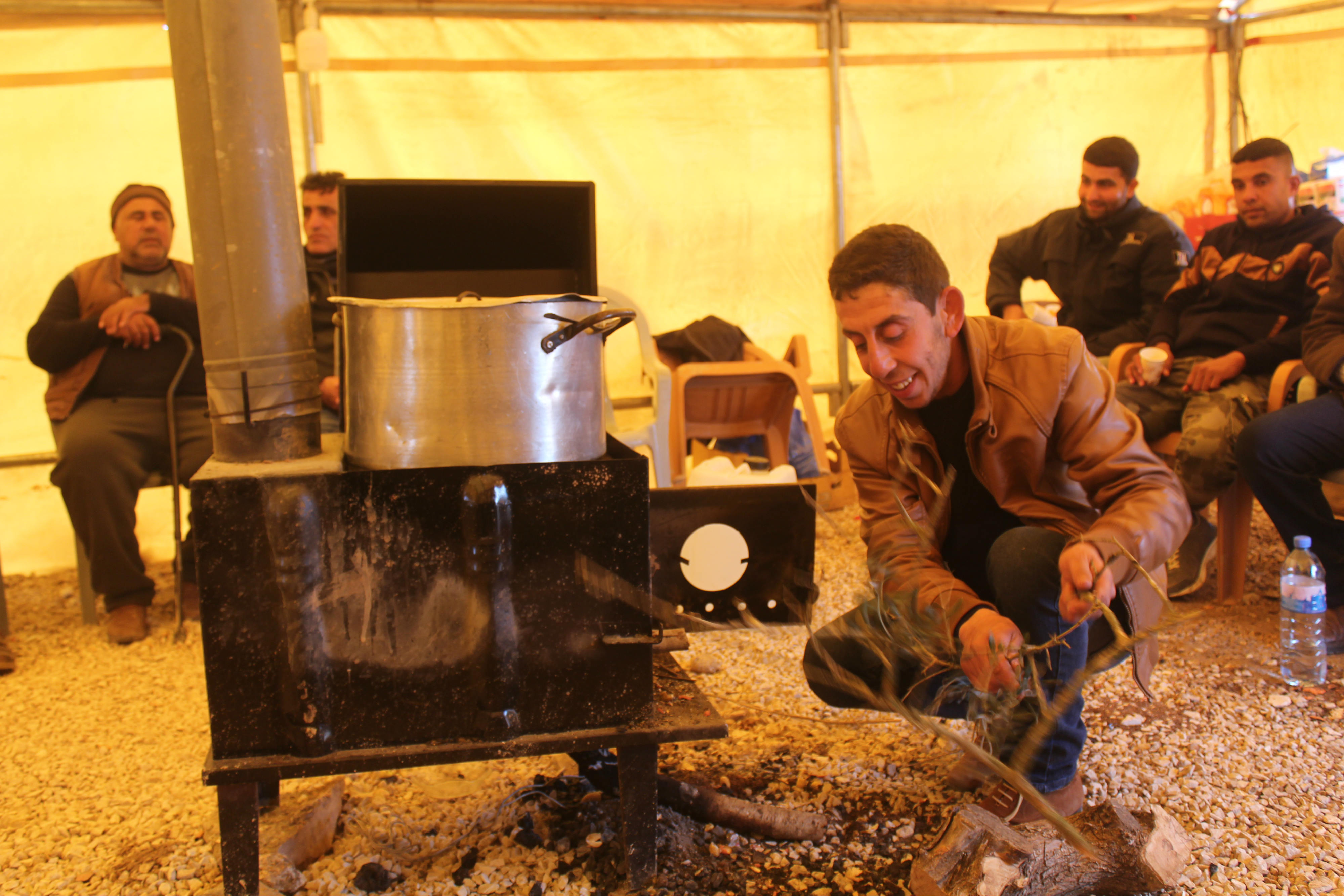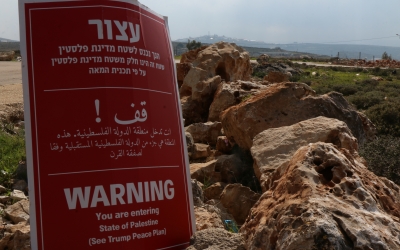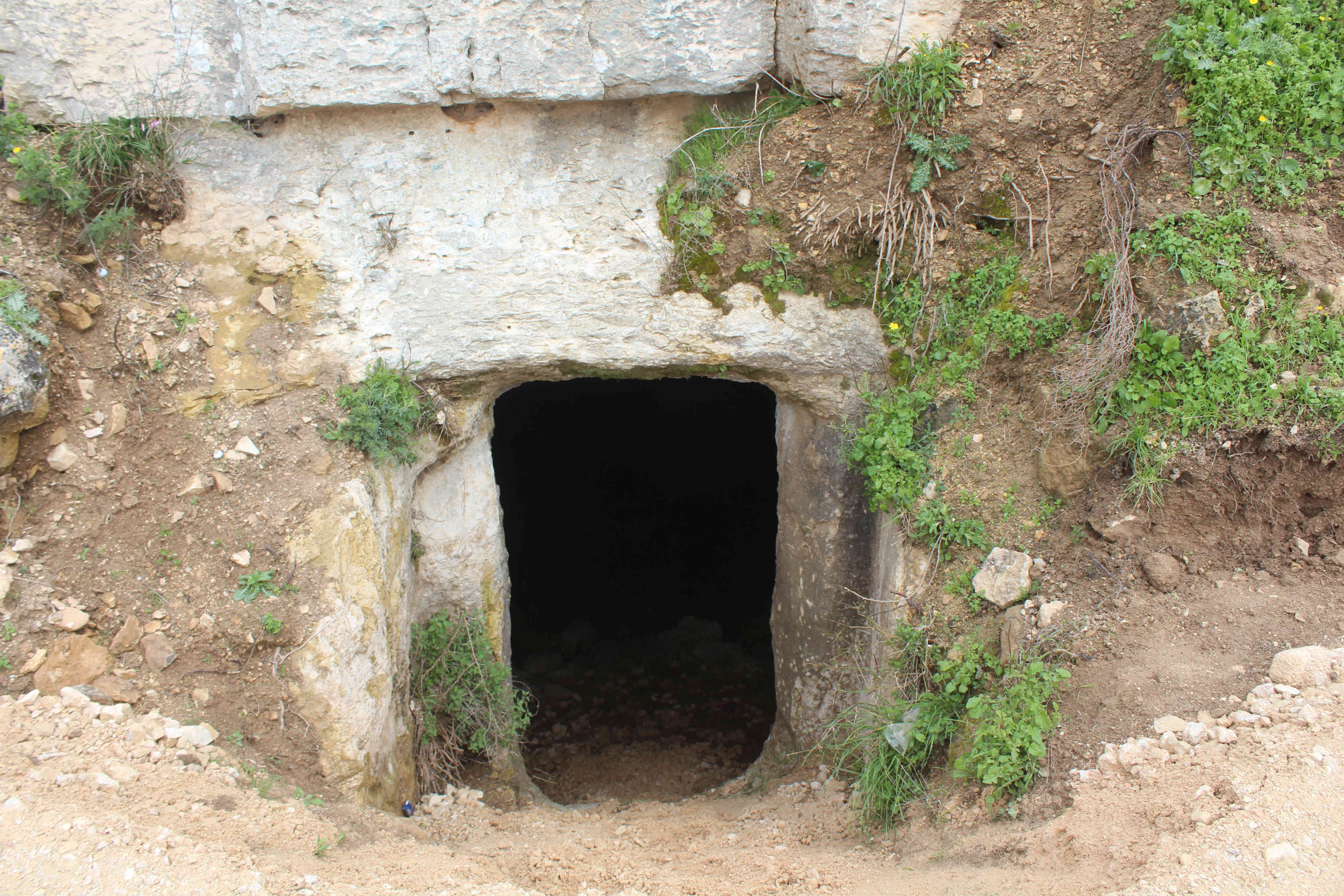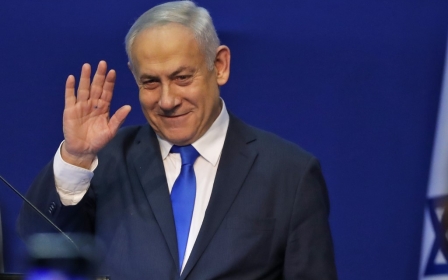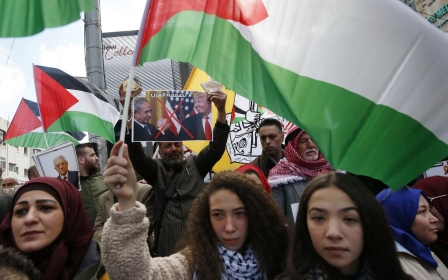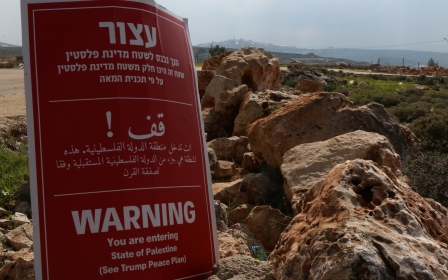'This is our mountain': Palestinians repel settlers emboldened by Netanyahu's words
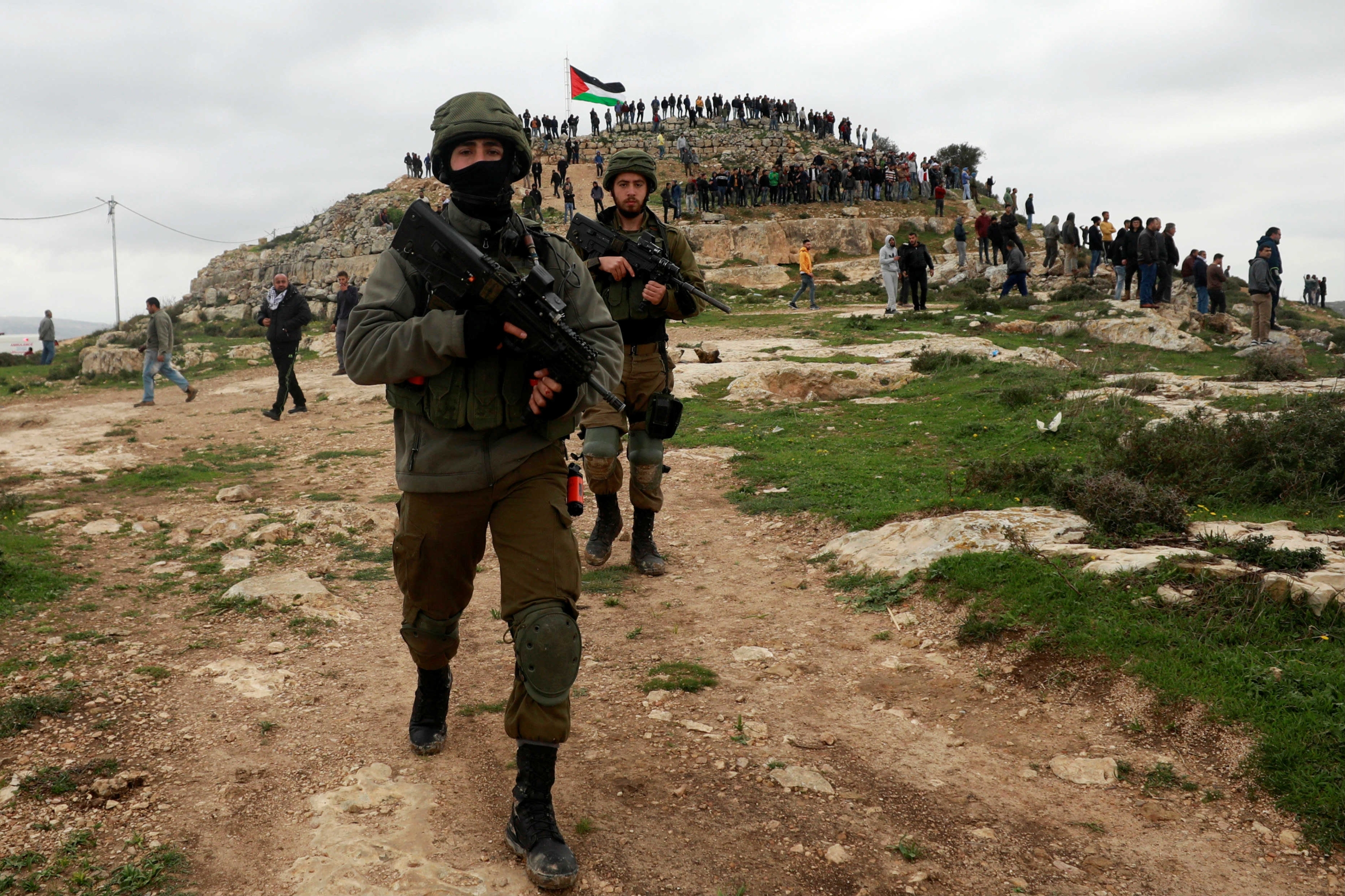
Around the stove, about 30 Palestinians gather inside a big tent on top of Mount Al-Urma, east of the town of Beita in the occupied West Bank, taking a rest and preparing for the latest confrontation with Israeli soldiers and settlers.
Hours earlier on Monday, settlers had tried for a second time to reach the top of the mountain, but the residents of Beita, which lies south of Nablus, had quickly gathered to defend their lands.
Clashes erupted, during which the Israeli army opened fire, wounding two Palestinians with live ammunition and 10 others with rubber bullets.
New MEE newsletter: Jerusalem Dispatch
Sign up to get the latest insights and analysis on Israel-Palestine, alongside Turkey Unpacked and other MEE newsletters
Residents of Beita have continued their daily sit-in at the top of Al-Urma since last Thursday after they were alerted to calls by settlers on social media to seize the mountain and turn it into an Israeli religious tourist route.
On Friday, the settlers had made their first attempt to seize Mount Al-Urma but were repelled by hundreds of locals.
The confrontation left 93 people injured by Israeli live fire and rubber bullets.
A huge Palestinian flag, measuring 4 metres by 3.5 metres, was flown 25 metres above the top of the mountain, and people started going regularly to the site, declaring it an open sit-in.
On Monday, when the settlers made their second attempt, 19-year-old Adham Zuhair told MEE that along with dozens of other youths taking part in the sit-in he had watched as the settlers tried to ascend the mountain towards them.
“We contacted the villagers, the mosques’ speakers began asking people to head to Mount Al-Urma... in less than 10 minutes hundreds of people had arrived here," he said.
The settlers retreated and withdrew under the cover of live fire from the Israeli army.
Zuhair said: "I am here 24 hours a day, I don't get tired nor do I feel bored... I will stay here to protect our lands, whatever it costs."
Netanyahu promises
On Wednesday, in the nearby village of Qusra, Israeli bulldozers began clearing land in what residents said was an attempt to confiscate it for future illegal settlements.
Villagers from Qusra challenged the Israeli soldiers guarding the bulldozers as they worked in a field close to the Migdalim settlement.
'I am here 24 hours a day, I don't get tired nor do I feel bored... I will stay here to protect our lands, whatever it costs'
- Adham Zuhair
Palestininans say settlers had been emboldened by US President Donald Trump's Middle East plan and Israeli Prime Minister Benjamin Netanyahu promise to annex settlements.
Netanyahu's right-wing Likud Party leads the vote count after Monday's election, but with 99 percent of votes counted on Wednesday he was still short of securing enough seats for a governing coalition.
Victory would pave the way for Netanyahu to make good on his pledge to annex settlements in the West Bank under Trump's plan.
Previous battles
Dozens of young men, helping maintain the flag mast, are dotted around the tent on Mount Al-Urma, as older men chat and groups of children play with the remains of gas bombs and a sound bomb left by the Israeli army.
Despite the cold, the only conversations among the people in the tent are about their pride in being able to protect their lands.
While one young man prepared coffee and began distributing it, other volunteers started making freekeh soup, a popular Palestinian food usually prepared in the winter as it provides the body with energy and warmth.
Leaning on his crutch, one of the volunteers, Muhammad Khrweish, tells how he was injured in clashes in Beita on 6 April 1988, when the villagers had previously confronted an attack by settlers.
Khrweish told MEE: "Since 1923, 70 people from the town of Beita were martyred and 300 injured.
"Meanwhile, the occupation has destroyed 25 houses, and detained about 3,000 people since 1967. It was all in the defence of our territory, and it is action we will continue to take."
Khrweish remembers how his village's residents protected Beita’s Jabal Sabih two years ago, when settlers attempted to take it.
"We spent two weeks sitting on the mountain so that we could prevent the settlers from seizing it," he said.
'We will not abandon our lands'
"Today, the settlers are testing themselves again in Beita," said Khrweish.
"They gathered 750 settlers and 200 soldiers on Friday 28 February, and more than 1,200 residents of the village came and defended their lands."
"The army and the settlers will try to take advantage of any moment we leave the mountain, so we will continue to stay here...
'We will not give up the mountain and will not abandon our lands'
- Muhammad Khrweish
“We will not give up the mountain and will not abandon our lands," said Khrweish.
Muhammad Jamal Bani Muflih, a 12-year-old child at the scene, told MEE: "I used to come here with my family or friends to take a walk and take pictures.
"Now I come every day to defend the mountain and prevent the settlers from approaching it.
"The only way to protect the mountain is to stay on it... We will not allow them to steal it from us, this is our mountain, and the monuments on it prove that."
'We demand his immediate release'
Last Thursday, settlers had published appeals on Facebook, calling for people to descend on Mount Al-Urma the next day, which Palestinian journalist Mujahid Beni Mafelah republished after translating them on his Facebook page.
Following the publication of his translation, Mafelah was arrested by Israeli police on charges of incitement on social media.
Assad Bani Mafelah, the journalist's brother, told MEE that the police had arrested his brother in the evening of last Thursday while he and his family were heading to Beita, leaving his wife and two children, aged two and three, near the Israeli settlement.
"The Israeli police continue to detain Mujahid in the Israeli detention centre and have extended his detention twice so far, the second time on Monday," said Assad.
"We are surprised that Mujahid, who was undertaking his role as a journalist in translating and publishing, was arrested.
"He only republished what the settlers wrote on their pages. As his family, we are worried about him, and we demand his immediate release allowing him to return to his children".
No evidence of Jewish monuments
Mount Al-Urma, which is spread over 250 dunums, is one of the most important archaeological areas in Nablus, and the highest peak in Beita.
According to historians, it has been inhabited since the early Bronze Age, about 3,200 years ago.
On top of the mountain, walls which still exist indicate that an ancient castle was built there, under which seven water tanks were dug into the rock.
Mufid Salah, the director of the Antiquities Directorate in Nablus, told MEE that the capacity of each tank was at least 1,500 cups, with stone channels between them reaching a depth of one and a half metres, which were used to store rainwater.
Salah said there were popular but unproven stories that, in the past, the storage tanks were used as prisons and to store weapons.
He said that items discovered so far on Mount Al-Urma date back to the Bronze, Roman, Byzantine and Islamic period, up until Ottoman times.
"Excavation at the site has not been completed yet, and many of the ruins are still not visible nor discovered, but we expect there will be many buried monuments," Salah added.
He said that excavations were carried out in the area at the beginning of the 1960s, but there was no evidence of Jewish monuments that the settlers are seeking to find.
"The Israeli search renewed around Mount Al-Urma in 2018 after expansion of the nearby settlement of Itamar and attempts to link the mountain to the Israeli Prophet Nun's compound," said Salah.
No settlements in Beita
Beita, with a population of 13,000 people, is spread over 23,000 dunums, most of which are classified according to the Oslo Accords as Areas B, where the Palestinian Authority has civilian rule but security remains controlled by Israel.
Despite the continuous attempts to confiscate Beita's lands, the town is completely devoid of settlement expansion as the town's citizens have repeatedly succeeded in repelling the settlers.
"We have a stubborn insistence that we will defend our land and we will not allow it to be a settlement centre," Fouad Ma'ale, the mayor of Beita, told MEE.
"The Itamar settlement on the land of the village of Awarta is adjacent to a house from the northern side and its settlers are carrying out continuous attacks on farmers and olive trees. However, it [the settlement] did not expand on the town's lands.
“Mount Al-Urma is the highest mountain in the southern part of Nablus, rising 840 metres above sea level.
"It overlooks the villages of Beita, Aqraba, Osrin, Awarta, Odla, as well as Jordan to the east and the Mediterranean coast to the west.
"The settlers and the Israeli army are trying to take control this mountain because of its important strategic position," continued Ma'ale.
Middle East Eye delivers independent and unrivalled coverage and analysis of the Middle East, North Africa and beyond. To learn more about republishing this content and the associated fees, please fill out this form. More about MEE can be found here.


